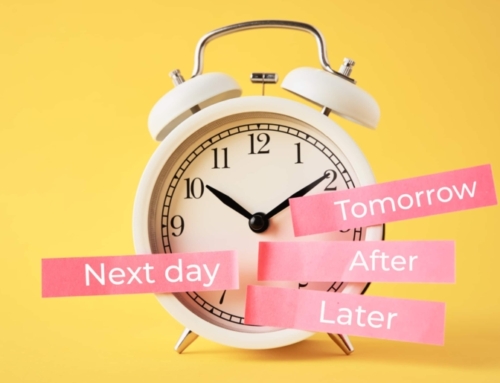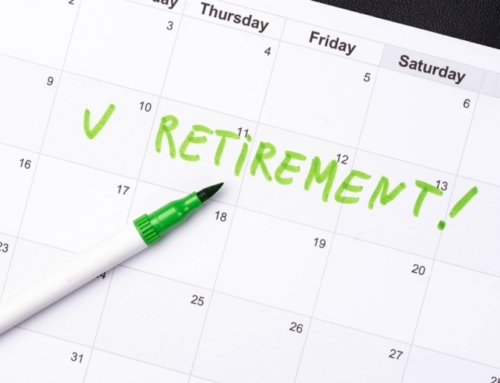I’m fairly productive overall but have certain areas in which I struggle with – and lose to – procrastination. The most bizarre one is my incredible resistance to making the phone calls I need to make. These are not painful phone calls; they are any calls, even to call friends to wish them a happy birthday. It’s completely irrational, but many aspects of procrastination are indeed foolish. So, despite limited time to learn if my early success will continue, here is my approach.
It has four parts, which I call: decogitate, de-emotionalize, decomplexify, and de-escalate. Some notes: cogitate means to think about or reflect on something. Decogitate is a neologism that means the opposite, to stop thinking about and reflecting on something. I made it up to match the other words in this series with the “de-“ prefix, and it’s also meant to be ironic because it’s a non-existent, inapt, and overly cerebral word that is imperative to stop being cerebral. I begin with a conceptualization of procrastination that will make clear how the proposed solutions work.
Procrastination
Procrastination is the voluntary and maladaptive delay in engaging in and completing a task. It is a form of avoidance, a common, if counterproductive, coping strategy. Avoidance occurs when a person is confronted with an aversive situation. In social phobia, the avoided aversive situation is one in which direct social engagement is required. In procrastination, the avoided aversive situation is one in which doing and completing a task is required.
Procrastination differs in degree from phobic avoidance in being irrational in the following way: in phobic avoidance, the avoided situation is aversive because of an association with a prior distressing or traumatic encounter, whereas in procrastination, the avoided task is often not strongly aversive when the person is doing it. In procrastination, thinking about (including visually imagining) the avoided task is often more aversive than doing the task, if and when that task is undertaken. Here, it is important to highlight the two aspects of this coping strategy to help arrive at a solution.
- Escape: escape is the leaving of a distress-causing situation that one is undergoing to decrease the distress of being in that situation
- Avoidance: avoidance is keeping away from a distress-causing situation to decrease the distress of imagining being in that situation
So, for a person with procrastination who wishes to overcome it, the biggest hurdle is managing the distress of thinking about the distressing aspects of a task that is not currently undertaken. Once that person undertakes it, the distress often begins to decrease. The procrastinator often regrets their procrastination, the days or weeks of distressing imaginings about a task that, in hindsight, was not worth all that distress. A dog’s bark may be worse than its bite and the imagining of a task may be worse than the doing of that task.
Just as in procrastination, in social phobia, there is likely to be a high degree of distress in thinking about being in a situation that is not occurring, but in contradistinction to procrastination, in social phobia that distress is likely to become even more severe once the situation is occurring. In other words, for a person with procrastination, the prior thinking is worse than the doing, while in social phobia, the being in is even worse than the prior imagining.
Decogitate
So, the solution for procrastination lies primarily in managing the distress of thoughts and imaginings that precede the doing of the task. And one simple way to decrease the distress is decogitation, that is, literally not engaging in those distressing thoughts and imaginings. This can be done through distraction and conscious suppression. For someone with a social phobia, the solution is not as simple: if they simply distract from or suppress their distressing imaginings, that will not allow them to enter a social situation because that social situation is more strongly aversive than the preceding imaginings of it. A person with social phobia may feel protected by their distressing imaginings because these imaginings prevent them from ever getting into a social situation. This, by the way, is why exposure therapy often starts with imaginal exposure before moving into in vivo exposure; imaginal exposure is less aversive and a good initial step.
So, what I do when faced with having to do a task that gives rise to thoughts and feelings of distress, is to NOT give in to continuing to focus on those distressing thoughts and feelings. I suppress them and, as quickly as possible, move to the doing of that task. Thus, I move past my hurdle of pre-engagement distress into the task itself, which again, is often less aversive than the prior imaginings of it.
De-emotionalize
When I began to pay attention to my inner experience that arose from confrontation with having to do something I didn’t want to do, I realized I had a strong and immediate aversive emotional reaction that accompanied those dread-inducing thoughts and imaginings. This distress-inducing experience was complex: I had propositional thoughts, such as, “Oh no, I don’t want to do that”, along with dysphoric feelings of let down, frustration, and irritation that accompanied visual imaginings of myself doing the dreaded task. In effect, I was engaging in associative learning, associating imaginings of the task with aversive thoughts and feelings about it. I realized that my initial reaction of distress strengthened the connection of the task with distress and made procrastination more likely the more I associated a task with distress. So, the sooner I could suppress thoughts and imaginings and distract myself from the stirrings of emotional distress, the easier it would be to get started on the task. Time was not on my side. Acting quickly meant I was more likely to act. And that meant short-circuiting the self-propelling doom loop of procrastination.
So, one part of the solution is to actively suppress and distract from the distressing emotions as soon as they become evident.
Decomplexify
One aspect of how an aversive task is perceived to be is its level of difficulty and complexity. The more steps that are required to complete a task, the higher the hurdle of what success is defined to be, and the higher the skill level needed to complete the task to reach a requisite level of excellence, the more aversive that task will be.
So, another part of the solution is to simplify the task and lower expectations of excellence. For example, one technique I learned from a life coach who works with procrastinating students is to tell yourself to “Work for a C+ rather than an A.” Now, it may not seem an attractive approach to decide on a lower quality of output. After all, most people want to do the best job they can and don’t want their kids to strive for mediocrity.
The secret here is that that initial message of “Work for a C+” lowers that initial hurdle to get into the doing of the task. Once a person begins doing it, the understanding of what needs to be done (and done well) increases. The first step is engagement, the second completion, and the third revisions for improvement. Perhaps counterintuitively, striving for a C+ is more likely to lead to A-level work than an initial striving for an A, which is more likely to lead to procrastination and tardy, incomplete, or shoddy work.
Simplifying the work can mean limiting the sources cited in a school essay, the degree of detail included in a report, the bells and whistles added to a product, etc. Another motto that applies and may resonate is “Start work to produce a minimally viable product”.
And last, regarding building skills: Whether I procrastinate making phone calls, a student delays writing an essay, or you allow a backlog of clinical notes to pile up, these activities are not conducive to becoming more skillful at these tasks. The focus is on the struggle with mounting distress and delay and the squeezing out of anything at the last minute or beyond. Once procrastination is minimized, the focus can and should turn to building skills. A clinician may procrastinate writing patient notes or reports because that clinician never learned how to do those well, or never learned what needs to be included and what is best excluded. Being more skillful gives the confidence to start a task because the steps to completion are clear and manageable.
De-escalate
This is keeping in mind that most tasks that lead to procrastination are not life-or-not situations. I’m not a rocket scientist or a brain surgeon. I procrastinate on things whose outcome, the difference between excellent and just good enough, is not largely meaningful. I just need to return phone calls, complete writing assignments, etc. Getting them done now is better than getting them done later, and both of those outcomes are better than never getting them done at all.
Last thought: I don’t like the verb ‘overcome’ applied to procrastination. Overcome implies more struggle, and a continual battle between parts of self, the taskmaster and the procrastinator. I feel exhausted just thinking about it this way. I prefer the following verbs regarding procrastination: dissolving, side-stepping, minimizing, or, even, making light of.
Thanks and take care,
Dr. Jack
Language Brief
“Never put off till tomorrow what may be done day after tomorrow just as well.” –Mark Twain
“Someday is not a day of the week.” – Janet Dailey
“God has promised forgiveness to your repentance, but He has not promised tomorrow to your procrastination.” –St. Augustine of Hippo
“Success is not obtained overnight. It comes in installments; you get a little bit today, a little bit tomorrow until the whole package is given out. The day you procrastinate, you lose that day’s success.” –Israelmore Ayivo







Leave A Comment